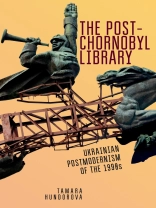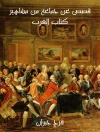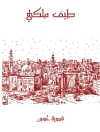Honorable Mention – American Association for Ukrainian Studies (AAUS) 2018-2019 Book Prize
Having exploded on the margins of Europe, Chornobyl marked the end of the Soviet Union and tied the era of postmodernism in Western Europe with nuclear consciousness. The Post-Chornobyl Library in Tamara Hundorova’s book becomes a metaphor of a new Ukrainian literature of the 1990s, which emerges out of the Chornobyl nuclear trauma of the 26th of April, 1986. Ukrainian postmodernism turns into a writing of trauma and reflects the collisions of the post-Soviet time as well as the processes of decolonization of the national culture. A carnivalization of the apocalypse is the main paradigm of the post-Chornobyl text, which appeals to “homelessness” and the repetition of “the end of histories.” Ironic language game, polymorphism of characters, taboo breaking, and filling in the gaps of national culture testify to the fact that the Ukrainians were liberating themselves from the totalitarian past and entering the society of the spectacle. Along this way, the post-Chornobyl character turns into an ironist, meets with the Other, experiences a split of his or her self, and witnesses a shift of geo-cultural landscapes.
Daftar Isi
Table of Contents
Preface
1. Nuclear Discourse, or Literature after Chornobyl
2. Nuclear Apocalypse and Postmodernism
3. The Socialist Realist Chornobyl Discourse
4. Nuclear (Non)-Representation
5. Chornobyl and Virtuality
6. Chornobyl and the Cultural Archive
7. Chornobyl Postmodern Topography
8. Chornobyl and the Crisis of Language
9. Postmodernism: The Synchronization of History
10. Ukrainian Postmodernism: The Historical Framework
11. A Farewell to the Classic
12. The “Ex-Centricity” of the Great Character
13. Postmodernism and the “Cultural Organic”
14. Postmodernism as Ironic Behavior
15. Bu-Ba-Bu: A New Literary Formation
16. The Carnivalesque Postmodern
17. Yuri Andrukhovych’s Carnival: A History of Self-Destruction
18. After the Carnival: Bu-Ba-Bu Postmortem
19. Narrative Apocalypse: Taras Prokhasko’s Topographic Writing
20. The Virtual Apocalypse: The Post-Verbal Writing of Yurko Izdryk
21. The Grotesques of the Kyiv Underground: Dibrova—Zholdak—Poderviansky
22. Feminist Postmodernism: Oksana Zabuzhko
23. Postmodern Europe: Revision, Nostalgia, and Revenge
24. The Chornobyl Apocalypse of Yevhen Pashkovsky
25. The Postmodern Homelessness of Serhiy Zhadan
26. Volodymyr Tsybulko’s Pop-Postmodernism
27. The (De)KONstructed Postmodernism of Yuriy Tarnawsky
28. PS. A Comment from the “End of Postmodernism”
29. Types of Postmodernism
Tentang Penulis
Dr. Sergiy Yakovenko teaches in the Department of English at Mac Ewan University. He received his Ph D in Comparative Literature from the University of Alberta. He is the author of Romantics, Aesthetes, Nietzscheans: Ukrainian and Polish Literary Criticism of the Early Modernist Period (2006) and Poetics and Anthropology: Essays on Ukrainian and Polish Prose on the 20th Century (2007), both books in Ukrainian.












